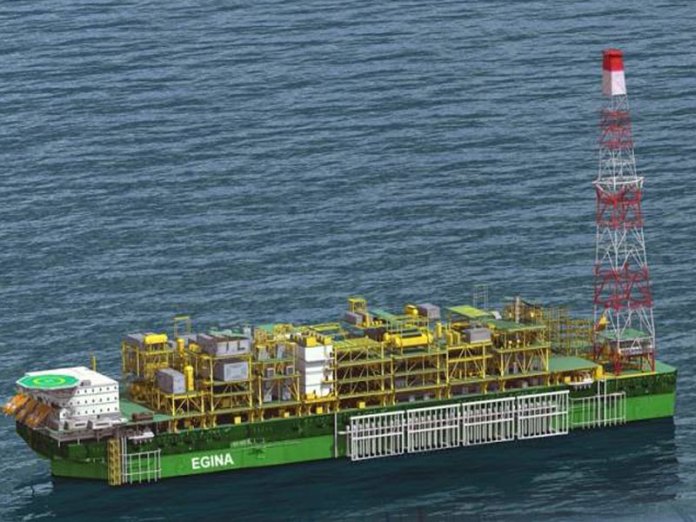- First Oil Expected From Egina Field in Q4 2018
Egina oil field, a major deepwater development in Nigeria, is expected to achieve first oil in the fourth quarter of 2018, with a capacity to increase the nation’s oil production by 200,000 barrels per day.
The Egina Floating Production, Storage and Offloading vessel is planned to sail away from Samsung Heavy Industries yard in South Korea for Nigeria by the third quarter of this year and should be in Nigeria in the fourth quarter, according to Total, the operator of the field.
The Managing Director and Chief Executive Officer, Total Upstream Companies in Nigeria, Mr. Nicolas Terraz, has said the oil major is committed to Nigeria despite the volatility in the global oil and gas industry.
He said the Total Group had invested $10bn in the Nigerian oil and gas sector in the last five years, with expertise and strong positions in the onshore, offshore and deep offshore.
“Our Egina field development, which is near completion, is expected to add 200,000 barrels per day to Nigeria’s output when it comes on stream in 2018,” Terraz said at the Nigerian Annual International Conference and Exhibition organised by the Society of Petroleum Engineers in Lagos.
He said, “Our industry is volatile; the world in a constant flux. And with our different backgrounds and perspectives, these sometimes constitute hurdles in the attainment of common objectives.
“In spite of this, Total is unflinchingly committed to the future of Nigeria. The company is present along the value chain from upstream to the downstream sector where Total is a leader, with close to 550 service stations across the length and breadth of Nigeria.”
According to him, the industry is facing a shakeout as oil price is still low and the economy is recovering from recession.
He highlighted the need to position the Nigerian oil industry to be able to absorb the vagaries of fluctuating price regimes, uncertainties and other challenges within the operating environment.
Terraz said, “Although the oil and gas business is a global one, we believe that the time has come for the SPE, other professional bodies in the industry and all other stakeholders to look inwards for home-made solutions that will help Nigeria cushion the effects and ride the wave of ups and downs, the good times and the bad times, in an increasingly unpredictable global market.
“There is no gainsaying the fact that global market conditions might be identical but the local circumstances of nations are unique to them. And so are the solutions.”
He said Total would continue to partner the SPE, the government, its partners and all stakeholders to build and nurture a stable oil and gas industry insulated from the oscillatory discomfort of the waves of boom and bust.
Speaking on the sidelines of the event, the company’s Executive Director, Corporate Affairs and Services, Mr. Abiodun Afolabi, said the six locally fabricated topside modules would be integrated on the FPSO at the SHI-MCI yard in Lagos before final sail-away to Egina site, deep offshore Nigeria.
“All is on course for first oil around first quarter 2018,” he said.
He said Total had made a commitment to deliver 300 million standard cubic feet per day of gas to the domestic market, corresponding to the capacity of its gas transportation infrastructure.
Afolabi said the oil major had received a number of Gas Purchase Orders from the Gas Aggregation Company of Nigeria.
“The first GPO was for supply of 100MMscf/d to Alaoji Power Station. The second GPO is to supply 126MMscf/d of gas to Indorama Petrochemicals proposed methanol plant for start-up in 2019. A third GPO to cover the remaining capacity of the NOPL i.e. 74MMscf/day, is currently being discussed with the GACN,” he said.

 Forex3 weeks ago
Forex3 weeks ago


 Naira2 weeks ago
Naira2 weeks ago
 Billionaire Watch2 weeks ago
Billionaire Watch2 weeks ago






 Naira3 weeks ago
Naira3 weeks ago






 Naira2 weeks ago
Naira2 weeks ago


 Naira1 week ago
Naira1 week ago




 Naira4 weeks ago
Naira4 weeks ago






 Naira1 week ago
Naira1 week ago






















